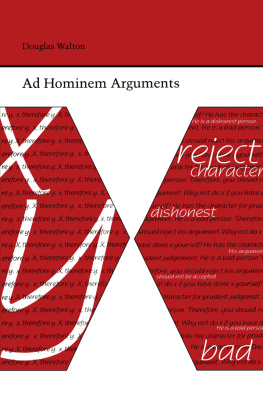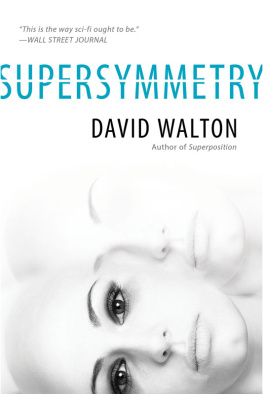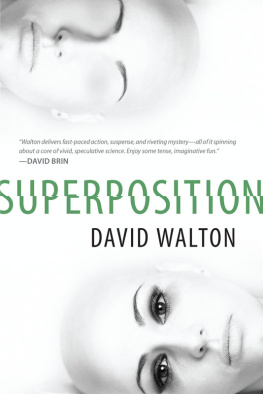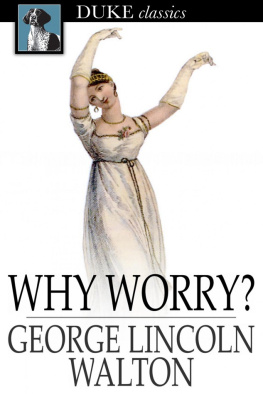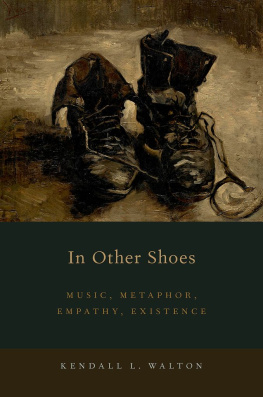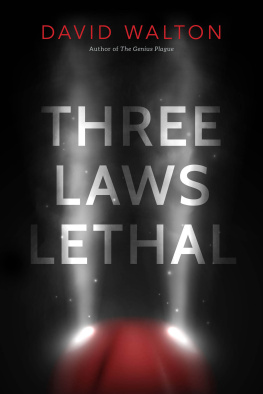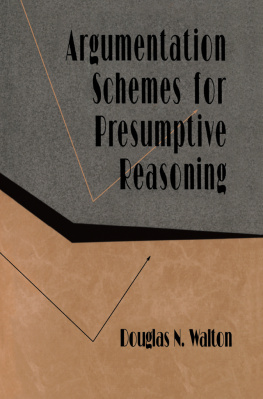Walton - Ad Hominem Arguments
Here you can read online Walton - Ad Hominem Arguments full text of the book (entire story) in english for free. Download pdf and epub, get meaning, cover and reviews about this ebook. City: Tuscaloosa, year: 2009, publisher: University of Alabama Press, genre: Romance novel. Description of the work, (preface) as well as reviews are available. Best literature library LitArk.com created for fans of good reading and offers a wide selection of genres:
Romance novel
Science fiction
Adventure
Detective
Science
History
Home and family
Prose
Art
Politics
Computer
Non-fiction
Religion
Business
Children
Humor
Choose a favorite category and find really read worthwhile books. Enjoy immersion in the world of imagination, feel the emotions of the characters or learn something new for yourself, make an fascinating discovery.
- Book:Ad Hominem Arguments
- Author:
- Publisher:University of Alabama Press
- Genre:
- Year:2009
- City:Tuscaloosa
- Rating:5 / 5
- Favourites:Add to favourites
- Your mark:
- 100
- 1
- 2
- 3
- 4
- 5
Ad Hominem Arguments: summary, description and annotation
We offer to read an annotation, description, summary or preface (depends on what the author of the book "Ad Hominem Arguments" wrote himself). If you haven't found the necessary information about the book — write in the comments, we will try to find it.
Walton: author's other books
Who wrote Ad Hominem Arguments? Find out the surname, the name of the author of the book and a list of all author's works by series.
Ad Hominem Arguments — read online for free the complete book (whole text) full work
Below is the text of the book, divided by pages. System saving the place of the last page read, allows you to conveniently read the book "Ad Hominem Arguments" online for free, without having to search again every time where you left off. Put a bookmark, and you can go to the page where you finished reading at any time.
Font size:
Interval:
Bookmark:

Copyright 1998
The University of Alabama Press
Tuscaloosa, Alabama 354870380
All rights reserved
Manufactured in the United States of America
The paper on which this book is printed meets the minimum requirements of American National Standard for Information Science-Permanence of Paper for Printed Library Materials, ANSI Z39.48-1984.
Library of Congress Cataloging-in-Publication Data
Walton, Douglas, 1942
Ad hominem arguments / Douglas Walton.
p. cm. (Studies in rhetoric and communication)
Includes biographical references and index.
ISBN 978-0-8173-0922-0 (cloth : alk. paper)
ISBN 978-0-8173-5561-6 (pbk : alk. paper)
1. Ad hominem arguments. 2. Persuasion (Rhetoric) 3. Reasoning. I. Title. II. Series.
P301.5.P47 W347 1998
808ddc21
98-8889
ISBN 978-0-8173-9114-0 (electronic)
For Karen, With Love
The ad hominem or personal attack argument is frequently the immediate defensive response to any new and powerfully upsetting argument on a controversial and polarized issue, especially when interests are threatened, and emotions are running high on the issue.
When Rachel Carsons classic of environmental literature Silent Spring (1962) first appeared, agribusiness and pesticide interests reacted with the following ad hominem arguments (Proctor, 1995, p. 51). Chemical World News called the book science fiction, comparing it to the television series The Twilight Zone and attacking Carsons capability and/or seriousness in collecting and using scientific evidence. A member of the U.S. Federal Pest Control Review Board replied: I thought she was a spinster. Whats she so worried about genetics for?using aspects of Carsons personal life in a snide attack suggesting that she should not be taken seriously as a person with any credibility. The director of New Jerseys Department of Agriculture replied that Carsons book was typical of that vociferous, misinformed, group of nature-balancing, organic-gardening, bird-loving, unreasonable citizenry that has not been convinced of the important place of agricultural chemicals in our economy. Other representatives of the chemical industry called the book a hoax and called Carson a fanatic defender of a cult (Proctor, 1995, p. 51).
Silent Spring turned out to be ahead of its time in its prescient warnings about the dangers of pesticides in the ecosystem, a subject of much discussion and concern in subsequent years. But the agribusinessand pesticide interests, evidently because of the difficulty they had dealing with the evidence she presented, replied with these ad hominem attacks, evidently designated to silence her by discrediting her personally. Ultimately, in this case, the ad hominem attacks were not successful, but in many other instances they have been, as we will see in the case studies in this book.
Ad hominem arguments have become such a common tactic used in attack ads (negative campaigning) in election campaigns that they have reached the point of being an obsession in media reporting of political discourse in the late decades of the twentieth century. Personal attack arguments have often proved to be so effective, in election campaigns, for example, that even while condemning them, politicians have not been able to stop using them. Although ad hominem arguments have been around for a long time, now more than ever, the problem of how to deal with them in a critically balanced way is a matter of concern for public discourse in a democracy.
As far back as the 1860s, Northern newspapers attacked Abraham Lincolns character in their political reporting of his policies (Bonevac, 1990, p. 48) by using the terms drunk, baboon, too slow, shattered, dazed and utterly foolish, and craftiest and most dishonest politician that ever disgraced office in America, to discredit Lincoln personally.
In the 1990s candidates hesitate to step forward and run for high political office because they know how much time and money will be spent searching out character details and past accusations of any kind of alleged misconduct by the oppo research of the other party.
They know that in many recent cases, politicians have been forced to confess or endure other humiliations in public for behavior thought to be ethically questionable or inappropriate. The so-called character issue, as pursued in attack journalism, has become central in American politics of the 1990s. There seems to be a consensus that character is all-important in political dialogue and that policy positions are of secondary importance, perhaps because they are more changeable. During this period, we have become very familiar indeed with the character attack type of ad hominem argument as a political instrument. The public has even, at certain times, indicated a revulsion at the excessive use of negative tactics in election campaigns, but the political media advisers still reserve it as a last-ditch powerful attack to be used if their side is behind in the polls and the election date is too close to retrieve a loss by other means.
Ad hominem arguments are easy to put forward as accusations, are difficult to refute, and often have an extremely powerful effect on persuading an audience to reject someones argument, when used at an opportune moment in an exchange, even when little or no evidencehas been brought forward to support the allegation. Indeed, personal attack on an arguers character can make him look dishonest and untrustworthy or illogical and confused. The resulting lack of credibility can make it impossible for the person to carry on effectively to defend his side of the disputed issue at all. A reputation can be stained by a drastic and colorful allegation because the powerful stigma of the accusation itself is such that the critical faculties of the audience are suspended, leaving a residue of doubt and mistrust, even though little or no verifiable evidence supporting the charge was brought forward by the accuser.
The cases studied in this book illustrate the power of the ad hominem attack, the difficulty of dealing with it as an argument, and the mischief that it can cause. Regrettably, it is a negative tactic that the spin doctors, among others, have become adept at using. In one case (), the wimp factor was used to defeat a candidate for governor by ads suggesting he was not a strong enough leader. In another case, the CEO of a company was attacked unfairly as a ruthless person by the union side in a strikethe workers even calling him a slimeballwith the result that the negotiations were stalled, and the company eventually slid into bankruptcy.
Personal attack is such a subjective and emotional type of argument that one might wonder whether it is possible to discover objective logical criteria that would enable a rational critic to evaluate ad hominem arguments as justifiable (correct) or fallacious (incorrect) in given cases. It may seem that the only effective and available defense against such an attack is to insist that one is insulted by the accusation and to attack the character of the one who made such an allegation. But this reply is to counter one ad hominem attack with another. Although it may be an effective rebuttal in some cases, in other cases it is not effective, and in still other cases, it has the effect of turning a reasoned critical discussion of an issue into a personal quarrel. The alternative proposed by this book is to give an analysis of the logical structure of the ad hominem argument to show not only how this type of argument can be used fallaciouslyas a sophistical tactic used deceptively to get the best of an opponent in an argumentbut also how it can be used correctly to attack an argument by questioning the arguers credibility. The aim then is not just to instruct the reader on how to attack someone using the ad hominem argument but how to do so in a rational manner, and how to reply in a rational way to such an attack.
Font size:
Interval:
Bookmark:
Similar books «Ad Hominem Arguments»
Look at similar books to Ad Hominem Arguments. We have selected literature similar in name and meaning in the hope of providing readers with more options to find new, interesting, not yet read works.
Discussion, reviews of the book Ad Hominem Arguments and just readers' own opinions. Leave your comments, write what you think about the work, its meaning or the main characters. Specify what exactly you liked and what you didn't like, and why you think so.

